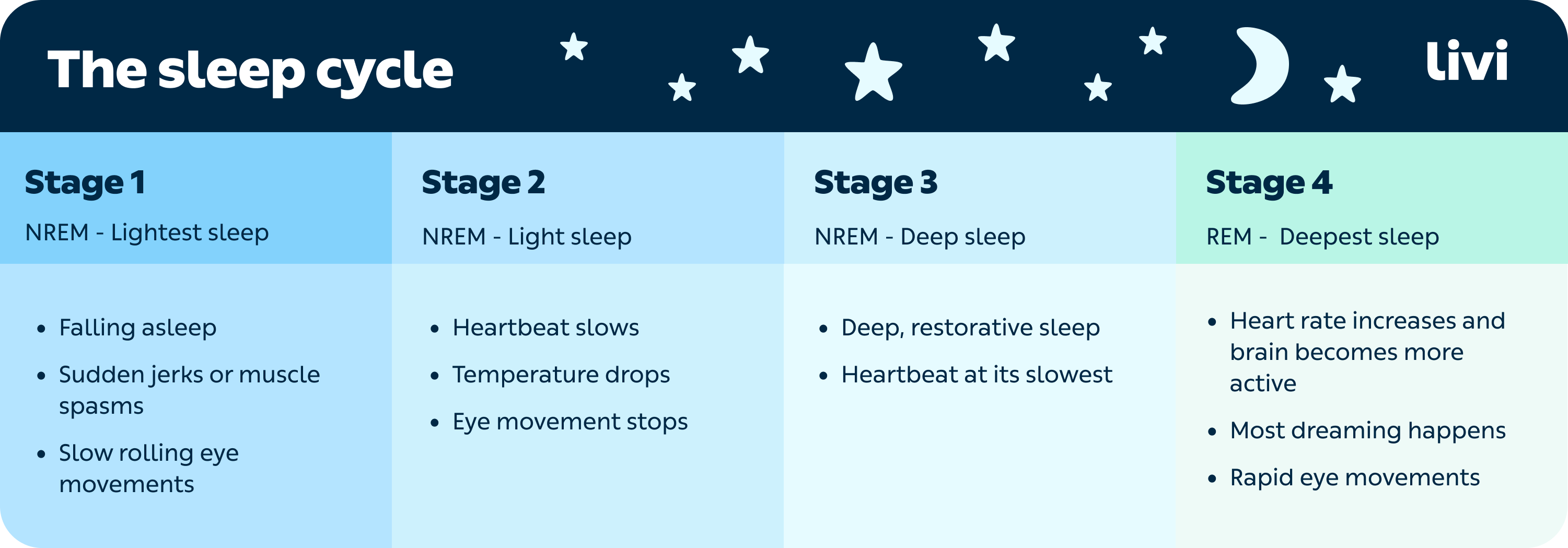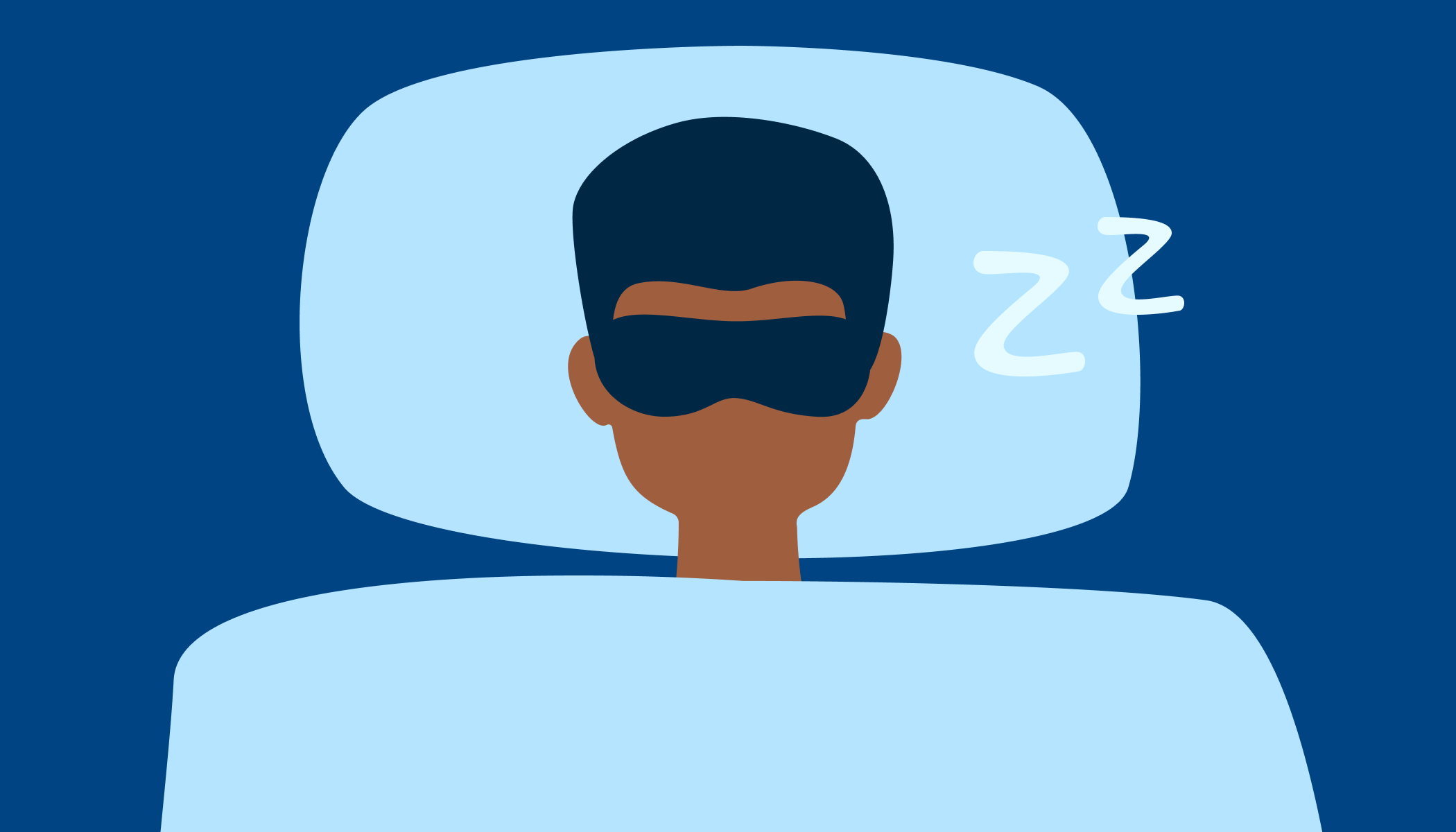Staring at the ceiling, tossing and turning in bed or randomly wide awake at 3am? Having trouble sleeping is common. A global sleep review found that up to one-third of us struggle to get the recommended 7 hours of sleep each night.
The pandemic has also impacted our sleep, with recent research showing that the majority of us are getting poorer quality sleep than before Covid-19.
So, what can we do to sleep better?
Why is sleep so important?
‘Good sleep is essential for your body and mind to function properly,’ says Dr Saloojee. ‘It’s as important as regular exercise and a healthy diet. Sleep helps us to feel alert and refreshed and can help us maintain a healthy weight and stave off diseases.
‘In contrast, poor sleep has negative effects on the body and can lead to reduced concentration, weight gain and an increased risk of problems such as heart disease, obesity and diabetes. Chronic sleep problems can also negatively impact our mood and mental health.’
Trouble sleeping is linked to a wide range of factors, from mental health problems like depression to shift work and stress.
This is why it’s important to explore the particular reasons for your own sleep problems – especially if it lasts more than a couple of months.
How much sleep do I need?
‘Most adults need between 7-9 hours of sleep at night to function optimally,’ says Dr Saloojee. ‘Children need even more.’
Getting a good night’s sleep is vital, so it’s worth taking seriously and prioritising your sleep as much as you can.
What are some common sleep problems?
- Difficulty falling asleep
- Waking up at night and having trouble falling back asleep
- Waking up early in the morning
Sleep problems can also include night terrors, nightmares and walking or talking in your sleep. All these things can also disrupt the quality of your sleep.
Sleeping poorly and being tired during the day can sometimes make us feel anxious around bedtime, which, in turn, can make it even harder to fall asleep. This can create a negative spiral where you associate sleep with stress rather than rest.
If this is the case for you, it’s important to work on reducing your stress levels – either with self-care or by speaking to a doctor or therapist.
What is deep sleep and how do I get more of it?
‘When we fall asleep, our bodies follow a sleep cycle that is divided into 4 stages,’ says Dr Saloojee. ‘Deep sleep is known as the most physically restorative stage of sleep.’
‘The first 3 stages are all called non-rapid eye movement (NREM) sleep and the fourth stage is called rapid eye movement (REM) sleep.’

Stage 1 NREM – lightest sleep
This is when your body is beginning to relax and you’re falling asleep. You might experience slow, rolling eye movements, sudden jerks or muscle spasms. At this stage, you can wake up easily
Stage 2 NREM – light sleep
This stage is a period of light sleep before you enter deeper sleep. Your heartbeat slows and your body temperature begins to drop. Stage 2 usually lasts the longest of the 4 stages.
Stage 3 NREM – deep sleep
Stage 3 is the period of deep, restorative sleep that helps you feel more refreshed the next day. Your heartbeat and breathing are at their lowest rate. It’s much harder for you to be woken up at this time.
Stage 4 REM – deepest sleep
The last stage is REM sleep, the deepest stage of sleep. It first happens about 90 minutes after you’ve fallen asleep. Your eyes move rapidly from side to side behind your eyelids, your heart rate increases and your brain becomes more active. This is when most of your dreaming occurs.
Each sleep cycle lasts 90-120 minutes and will repeat several times during the night until you wake up. NREM usually makes up 80% of each cycle.
‘Having good sleep hygiene – or a regular sleep routine – can help improve the quality of your sleep and increase the deeper NREM sleep that helps you feel refreshed the next day,’ says Dr Saloojee.
How can I sleep better?
Dr Saloojee recommends these tips for a good bedtime routine and getting better, deeper sleep:
During the day
- Keep your sleep routine as consistent as possible
Our internal body clock regulates our sleep cycle, controlling when we feel tired or alert. The clock operates on a 24-hour cycle, known as the circadian rhythm.
Keeping a consistent sleep and wake time, even on weekends, will help keep your circadian rhythm on track.
- Spend time outdoors
Getting some sun (or artificial bright light) during the day helps keep our circadian rhythm healthy. Research has shown that daily light exposure increases sleep quality and duration at night, too.
During the evening
- Be mindful of caffeine
Try to avoid caffeine in the late afternoon and evening. Caffeine stimulates your nervous system and keeps you alert, which you don’t want at night. Caffeine levels in your body can remain elevated for 6-8 hours and can significantly impact your sleep quality.
- Watch your alcohol intake
Drinking can also negatively affect your sleep. Research has shown that while alcohol can make you sleepy at first, it may interrupt your sleep later at night and in the early morning. Drinking has also been linked to snoring.
- Turn down the lights
Avoid too much light – including blue light from your TV, phone and laptop – in the evening as this can trick your circadian rhythm into thinking it’s still daytime. This in turn reduces hormones like melatonin, which helps you relax and sleep well.
- Wind down before bedtime
Relaxing in the evening will help to lower your stress levels and potentially prevent a racing mind before bed. Take a bath or shower, read a book, listen to music, try meditation or do some breathing relaxation techniques.
Just before bed
- Increase your chance of uninterrupted sleep
If you live with a snorer or know the daylight wakes you early, small changes can make a big difference. Make sure your bedroom is dark and quiet – use thick curtains, blinds or an eye mask and earplugs.
When you wake up
- Keep a sleep diary
Make a note of when you sleep badly and when you sleep well. This will help you identify potential triggers or factors and will be useful if you talk to a doctor.
What if my sleeplessness is becoming a long-term problem?
If you’re regularly having problems sleeping, you may have insomnia.
Speak to a doctor if:
- You’ve already tried some simple lifestyle solutions
- Your insomnia has lasted a few months or more
- Your sleeping problems are making it hard to cope with your daily life
A doctor will be able to help identify and advise on the possible causes of your insomnia and give guidance on good sleep hygiene. They may refer you for talking therapy like cognitive behavioural therapy (CBT), which may help uncover the underlying reasons you’re having trouble sleeping.
In rare situations, a doctor may prescribe medication. In the case of chronic sleep disorders, you may be referred for an investigation in a sleep laboratory. This might include an in-depth analysis and monitoring of your sleep.
This article has been medically reviewed by Dr Roshaan Saloojee, a Livi GP.


